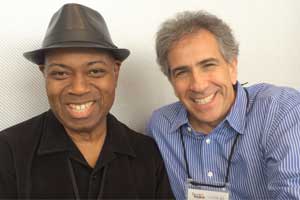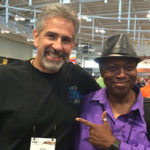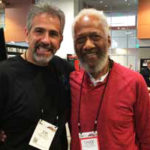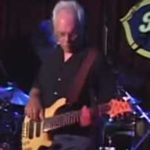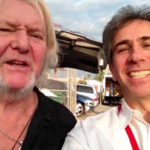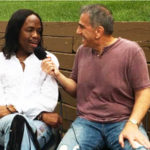Amazing funkateer and Ramsey Lewis alumnus talks about his career, mentors, equipment and more
Exclusive interview with FBPO’s Jon Liebman
November 22, 2010
Bill Dickens has played bass with a wide variety of artists, including Pat Metheny, George Michael, Joe Zawinul, Janet Jackson, Grover Washington, Jr., Chaka Khan, Mary J. Blige, Freddie Hubbard, Al DiMeola, Dennis Chambers, Steve Morse, Randy Newman and many others. He also held down the bass chair for pianist Ramsey Lewis for several years, recording on Lewis’ Les Fleurs, A Classic Encounter, and Urban Renewal albums. Dickens is well known for using extended-range basses and for his speed funk.
FBPO: Tell me about your musical upbringing.
BD: I started playing at the age of 3. My mom used to take me to the Regal Theater in Chicago on weekends. I saw acts like James Brown and the Motown Review. Whenever I expressed interest in an instrument, my parents not only bought it for me, but gave me lessons, too. My mom made sure I learned to read music.
FBPO: How did you end up as a bass player?
BD: When I was 3, I told my mom I wanted to play the instrument that went “boom-boom.” She thought I meant the drums, so I started out by playing them. One day, we were in a music store and I saw a big bass hanging on the wall. I pointed up and said, “Boom-boom,” and she just bought it for me! So I was taking both drum lessons and bass lessons.
FBPO: Which bass players inspired you the most when you were an up-and-coming bassist?
BD: James Jamerson, Tim Bogert, Chris Squire, Michael Henderson, Louis Johnson, Verdine White, Jaco Pastorius, Jeff Berlin, Aaron Mills, and Chuck Rainey.
FBPO: Did you ever play upright bass?
BD: From time to time, like for Broadway musicals. I have an electric upright.
FBPO: Can you identify a turning point, a defining moment, when it became clear that you were going to become a professional musician?
BD: When I was 13, I was playing in clubs. I was way too young to be in a club and I was making like $200 a night. I would return to school the next day and eat in the Teachers’ Lounge since I had lots of cash the other kids didn’t have. Thats when I knew this was for me.
FBPO: Did you have a mentor or a special teacher who stands out in your mind as critical to your musical development?
BD: Yes, my main teachers were Gene Harris, Monk Montgomery, Freddie Hubbard, Ramsey Lewis and Henry Johnson. All of these guys introduced me to jazz and improvisation, teaching me to groove, as well as play through changes.
FBPO: Talk a little about the types of basses you like to play. It seems that, in most cases, a 4-string just isn’t enough for what you want to do. Is that an accurate statement?
BD: No! From time to time I play a 1964 Class A, pre-CBS, Fender Jazz bass and my Anthony Jackson/Ken Smith contrabass, which is the only one in existence. I recorded an album for Ramsey Lewis with the London Symphony at Abbey Road playing that bass. I’ve also performed with it on the Arsenio Hall Show. The solo I played on that show gave me worldwide recognition. After leaving Ramsey in 1990, I quit playing bass to become a record producer. I picked the bass back up in ’92. Around that time, I found Bill Conklin at the Summer NAMM show in Nashville. The next thing I knew, the Bill Dickens signature model bass by Groove Tools was born. After that one came the 7-string and then the 9-string. It was a natural progression. Nowadays, I’m playing the 7-string, a 6 string Wyn bass and a 5-string Lakland.
FBPO: What was it like playing “The Day the Bass Players Took Over the World” with Victor Wooten, Oteil Burbridge and the rest of that group?
BD: I felt like I was the grandfather of the bass players, playing alongside thirty-three teenagers! They all brought something new to the table that I had never heard before. It was their youthful sound, not that they were that much younger than I was. I especially remember getting this feeling from Victor Wooten, Steve Bailey, Oteil Burbridge and Dave Pomeroy. I am extremely proud to have been a part of something that has gone down in history. So far it hasn’t been repeated.
FBPO: You’ve performed with such a wide variety of artists over the years. What can we look forward to seeing from Bill Dickens in the future?
BD: You’ll see less of me – I lost 100 pounds this year! Hopefully, you’ll see more from me with the Meters Experience and a new CD I’m mixing. Also, I’m back in the studio writing pop tunes. This year, I played with Louis Johnson from the Brothers Johnson and Kirk Whalum. I hope to play with other artists such as these.
FBPO: So, how’d you get the nickname “Buddha?”
BD: When Roy Wooten saw me at NAMM after I’d shaved my head, he went and told his brothers, Victor and Regi, that I looked like Buddha. At least that’s the story that was relayed to me from Victor. What’s kind of funny is that at the last NAMM show in LA, people were calling me “Buddha Lite” because of the weight loss.
